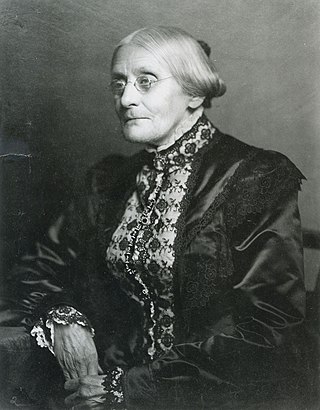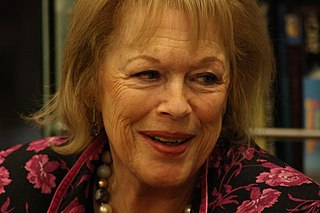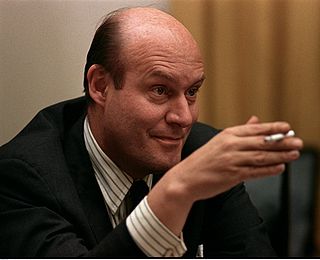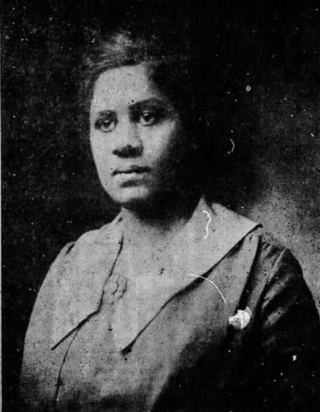Related Research Articles

Susan B. Anthony was an American social reformer and women's rights activist who played a pivotal role in the women's suffrage movement. Born into a Quaker family committed to social equality, she collected anti-slavery petitions at the age of 17. In 1856, she became the New York state agent for the American Anti-Slavery Society.

Lady Antonia Margaret Caroline Fraser, is a British author of history, novels, biographies and detective fiction. She is the widow of the 2005 Nobel Laureate in Literature, Harold Pinter (1930–2008), and prior to his death was also known as Lady Antonia Pinter.

The National Press Club is a professional organization and social community in Washington, D.C. for journalists and communications professionals. It hosts public and private gatherings with invited speakers from public life. The club also offers event space to outside groups to host business meetings, news conferences, industry gatherings and social events.

Nicholas deBelleville Katzenbach was an American lawyer who served as United States Attorney General during the Lyndon B. Johnson administration. He previously served as United States Deputy Attorney General under President John F. Kennedy.

Elizabeth Stuart Phelps Ward was an early feminist American author and intellectual who challenged traditional Christian beliefs of the afterlife, challenged women's traditional roles in marriage and family, and advocated clothing reform for women.

Dana Ruth Bash is an American journalist, news anchor, and chief political correspondent for CNN.

Vivian Juanita Malone Jones was one of the first two black students to enroll at the University of Alabama in 1963, and in 1965 became the university's first black graduate. She was made famous when George Wallace, the Governor of Alabama, attempted to block her and James Hood from enrolling at the all-white university.
Katzenbach v. Morgan, 384 U.S. 641 (1966), was a landmark decision of the Supreme Court of the United States regarding the power of Congress, pursuant to Section 5 of the 14th Amendment, to enact laws that enforce and interpret provisions of the Constitution.

Elizabeth Shippen Green was an American illustrator. She illustrated children's books and worked for publications such as The Ladies' Home Journal, The Saturday Evening Post and Harper's Magazine.

Helen Churchill Candee was an American author, journalist, interior decorator, feminist, and geographer. Today, she is best known as a survivor of the sinking of RMS Titanic in 1912, and for her later work as a travel writer and explorer of southeast Asia.

Robert Hunter was an American sociologist, progressive author, and golf course architect.
Mildred Seydell was an American pioneering female journalist in Georgia. Seydel wrote as a syndicated columnist and founded the Seydell Journal, a quarterly journal that was the successor to The Think Tank a short-lived biweekly journal of poetry, articles and reviews (1940–1947). She also founded the Mildred Seydell Publishing Company, and was a regular on the lecture circuit.

Lillian Baynes Griffin (1871–1916) was a British-born American journalist and photographer who contributed to publications including TheNew York Times and Vanity Fair. Her article topics ranged from medical treatments and art criticism to gardening, needlework and Rose Pastor Stokes, and among her portrait subjects were Grover Cleveland’s family, John Jacob Astor VI, Winslow Homer and European royalty. She was the sister of the naturalist Ernest Harold Baynes (1868–1925) and the wife of the artist Walter Griffin (1861–1935).

Women's suffrage was established in the United States on a full or partial basis by various towns, counties, states and territories during the latter decades of the 19th century and early part of the 20th century. As women received the right to vote in some places, they began running for public office and gaining positions as school board members, county clerks, state legislators, judges, and, in the case of Jeannette Rankin, as a member of Congress.

The 1913 New Jersey gubernatorial election was held on November 4, 1913. Democratic acting Governor James Fairman Fielder, who resigned a week before the election so that he could succeed himself, defeated Republican former Governor Edward C. Stokes and Progressive former State Senator Everett Colby.

Olivia Stokes Hatch was an American philanthropist, clubwoman, and travel writer.

Ora Brown Stokes Perry (1882–1957) was an American educator, probation officer, temperance worker, suffragist, and clubwoman based in Richmond, Virginia.

Ashley Elizabeth Hinson is an American politician and journalist serving as the U.S. representative for Iowa's 2nd congressional district. She has served in the House since 2021, representing a northeastern district including Cedar Rapids, Waterloo, Cedar Falls, and Dubuque.

Women's suffrage in Nevada began in the late 1860s. Lecturer and suffragist, Laura de Force Gordon, started giving women's suffrage speeches in the state starting in 1867. In 1869, Assemblyman Curtis J. Hillyer introduced a women's suffrage resolution in the Nevada Legislature. He also spoke out on women's rights. Hillyer's resolution passed, but like all proposed amendments to the state constitution, must pass one more time and then go out to a voter referendum. In 1870, Nevada held its first women's suffrage convention in Battle Mountain Station. In the late 1880s, women gained the right to run for school offices and the next year several women are elected to office. A few suffrage associations were formed in the mid 1890s, with a state group operating a few women's suffrage conventions. However, after 1899, most suffrage work slowed down or stopped altogether. In 1911, the Nevada Equal Franchise Society (NEFS) was formed. Attorney Felice Cohn wrote a women's suffrage resolution that was accepted and passed the Nevada Legislature. The resolution passed again in 1913 and will go out to the voters on November 3, 1914. Suffragists in the state organized heavily for the 1914 vote. Anne Henrietta Martin brought in suffragists and trade unionists from other states to help campaign. Martin and Mabel Vernon traveled around the state in a rented Ford Model T, covering thousands of miles. Suffragists in Nevada visited mining towns and even went down into mines to talk to voters. On November 3, the voters of Nevada voted overwhelmingly for women's suffrage. Even though Nevada women won the vote, they did not stop campaigning for women's suffrage. Nevada suffragists aided other states' campaigns and worked towards securing a federal suffrage amendment. On February 7, 1920, Nevada became the 28th state to ratify the Nineteenth Amendment.
Cora Rigby was an American journalist who was the first woman at a major newspaper to head a Washington News bureau and was one of the founders of the Women's National Press Club.
References
- 1 2 "Master Class: The professor is in and he's teaching life lessons". The Mass Connection. 2013. Retrieved 26 February 2023.
- 1 2 "Elizabeth Stokes, former journalist". New York Times. 27 October 1973. Retrieved 25 February 2023.
- ↑ Beasley, Maurine H. "The Women's National Press Club: Case Study in the Professionalization of Women Journalists" (PDF). ERIC. Department of Education. Retrieved 26 February 2023.
- 1 2 Klein, Gil. "NPC in History: Gram Robinson, women's suffrage and the Women's National Press Club". The National Press Club. Retrieved 25 February 2023.
- ↑ Conroy, Sarah Booth (2 October 1995). "Journalists ahead of their time". Washington Post. Retrieved 25 February 2023.
- ↑ King, Elizabeth Miner. "Has America the fighting spirit?". Harper's Magazine. Retrieved 26 February 2023.
- ↑ "Harold Phelps Stokes papers". Archives at Yale. Retrieved 25 February 2023.
- ↑ Arnold, Laurence (9 May 2012). "Nicholas Katzenbach, Kennedy's Civil-Rights Envoy, Dies at 90". Bloomberg. Retrieved 26 February 2023.
This article needs additional or more specific categories .(February 2023) |